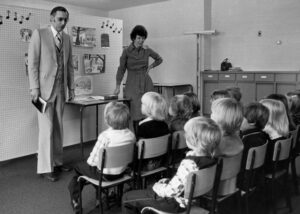Whether you call it Sunday school, faith formation or Christian education, one aspect of a congregation’s life together is how we nurture faith in people of all ages. Last spring, with the coming of the COVID-19 restrictions, many churches saw drastic changes in their faith education programs.
I chatted recently with folks who have responsibilities around faith formation in a congregation. Over the past ten months, their congregation has been worshipping through pre-recorded and Zoom services and has not had any larger in-person gatherings. These educators spoke about challenges and opportunities they faced.
They’ve worked hard to maintain connections with scattered congregants, planning online activities and outdoor events with minimal risk. They appreciated the flexibility for activities to happen outside of the regular Sunday morning slot. During the pandemic, congregants have been more available, because of fewer time commitments, travel or sports activities to fill their calendars. Plus, if participants are connected via the internet, activities happen without transportation logistics or weather cancellations.
Now more than before, planners and teachers have accessed online resources, for example photos and videos to share with learners. They’ve also availed themselves of opportunities for virtual professional development.
During a series on racism, the congregational worship times flowed easily and quickly into the adult discussion times, with minimal interruptions. And, without the usual large-group adult class gathered in one place, some of the adults committed themselves to smaller study and discussion groups. This year there were no summer vacations to interrupt the activities.
There were, of course, challenges. For some people, the online activities just don’t have appeal, or they don’t even have access to the technology. When hands-on materials were distributed to homes, it was hard to measure whether families appreciated or used them. For younger children, the activities depended on parents’ help, which may or may not have been available. Sharing content online required extra logistics and expense for obtaining permission to use copyrighted materials.
Maybe some of these benefits and challenges resonate with your experience. How has your church been nurturing your faith together? What new opportunities have you found to grow in faith together?
You may be using the printed and online resources of CommonWord and MennoMedia. Maybe you have accessed webinars and speakers offered by regional churches and Anabaptist post-secondary institutions.
How might congregational educators find ways to better share their experiences and resources with each other? As Christian education continues in large part online, can help be given, at a more centralized level, for obtaining permissions for copyrighted materials? How do we make sure that all congregants, regardless of their circumstances, are learning and growing as disciples?
As our churches operate in the reality brought about by the pandemic, and as we envision reality on the other side of this coronavirus season, it will be necessary to keep creating and refining congregational practices around faith formation for all.
Mennonite schools too continue to invent and adapt. Check out the Focus on Education on pages 25-30 of this issue to catch glimpses of how the schools are helping to nurture students’ faith in their own settings.
Responding to violence
The violent protests that broke out at the U.S. Capitol building on Jan. 6 shocked and troubled many, even those of us living many kilometres away. The rioters’ symbols, words, and actions elicited strong condemnation and lament among people of goodwill. Both Mennonite Church USA and Mennonite Church Canada responded with public statements.
MC Canada’s statement read in part, “As leaders of Mennonite Church Canada and its regions, we pray for our siblings in Mennonite Church USA and, together with them, lament the escalation of violence that led to Wednesday’s events on Capitol Hill. We condemn white supremacy and Christian nationalism that are revealing themselves in American and Canadian society.”
In the days that follow this troubling event, all of us must scrutinize the ways in which hateful attitudes have been allowed to grow in our nations, our communities and in our own hearts. Let us resolve to seek and spread the peace of Christ with all the creativity we can muster, and with God’s help to live courageously into truth and justice.
Read more editorials:
First draft
Under the sparkling stars
Gifts received, gifts given
One hundred years
Good conversations









Leave a Reply
You must be logged in to post a comment.